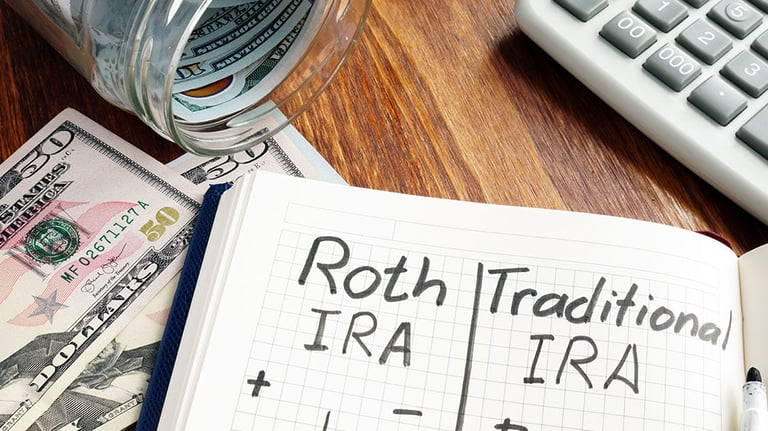

Saving for retirement can be an overwhelming undertaking. But the sooner you start yourself on your saving journey, the better off you will be in the long run. Having funds you can rely on in your retirement ensures that you can keep living the life you want without worrying about money.

How can I save for retirement?
There are several options available to you when you want to start saving for retirement. Like 67% of Americans in the private sector, you may have access to an employer-sponsored retirement program like a 401(k). This is probably your most direct route. However, saving for retirement is crucial regardless of how you start.
Even if you haven’t begun saving yet, asking questions is an essential first step.
Why is saving for retirement important?
Most U.S. workers hope to retire around the benchmark age of 65. On top of that, modern life expectancy puts women at an average of 81 years and men at 76 years.
What does that mean? You’ll need savings to rely on from a minimum age of 65 to a maximum of 81, at the very least. That’s 16 whole years. It’s important to save for retirement so that you can take care of yourself during that time.

What is an IRA?
Simply put, an IRA, or an Individual Retirement Account, is a place for you to store money away for retirement while you’re working. One of their main draws is their tax benefits. For example, a traditional IRA lets you contribute earnings to your account before taxes touch it. There it can continue to grow until your retirement. They come in a few varieties, and most employers offer them.
What is the difference between a traditional and Roth IRA?
There is, essentially, one key difference to keep in mind when you compare a traditional IRA and Roth IRA. With a Roth IRA, you contribute after-tax dollars. So, your tax benefits don’t happen immediately. However, you still get those benefits down the road when you withdraw from the account. You don’t have to pay taxes on the funds you withdraw from a Roth IRA during your retirement.

What is the difference between a traditional 401k and Roth 401k?
The main difference between a 401(k) and a Roth 401(k) comes down to their tax benefits. 401(k)s have you contribute pre-tax income, whereas Roth 401(k)s require after-tax money. With that, you don’t have to deal with income taxes when you withdraw money from the Roth account. However, their contribution limits are typically smaller than traditional 401(k)s.
Compared to IRAs, 401(k)s usually come with employer matching programs but less investment flexibility and lower contribution limits.
Should I be saving in my 403B?
403(b)s are only available to people in specific areas of work, namely public schools, nonprofits, and certain government positions.
If you work in those areas, your employer probably offers you a 403(b) plan. And, like a 401(k), any money put in grows tax-free until you withdraw the funds. That has a chance of working well for you since most people end up in a lower tax bracket during their retirement. If that’s not the case, then maybe consider other alternatives.

Is investing in an HSA considered investing in my retirement?
An HSA (Health Savings Account) is considered an investment in your retirement. It will help pay medical expenses as well as gather wealth over time. They’re a before-tax based contribution account and can help fill in the gaps of your Medicare in the future. But you are better off having an HSA in combination with other retirement savings accounts.
Are there other retirement saving solutions?
You may be looking for other ways to save money for retirement. Or, you may not have access to the above options. If so, here are a few other choices to consider:
- Open a taxable brokerage account
- Invest in real estate
- Invest in a business startup
